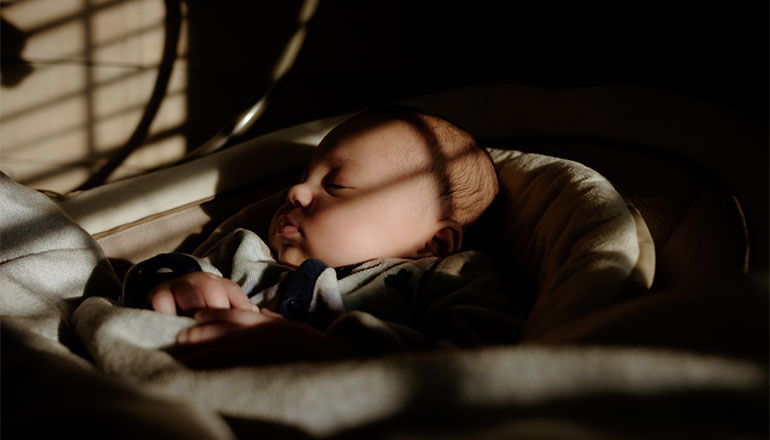(Missouri Independent) -The House gave initial approval Wednesday to a bill that would allow newborns to remain with their incarcerated mothers for the first year and a half of the baby’s life.
The bill would permit the Missouri Department of Corrections to establish nurseries within the state’s correctional facilities, allowing children born to incarcerated women to stay with their mothers behind bars for up to 18 months.
The legislation has garnered bipartisan support and it requires another vote in the House before it can be sent to the Senate for consideration.
“It is the right thing to do,” said Rep. Bruce DeGroot, R-Ellisville, and the bill’s sponsor, later adding: “This bill makes Missouri a better place for our kids.”
The issue is deeply personal to some lawmakers.
Rep. Kimberly-Ann Collins, a St. Louis Democrat who has advocated for criminal justice reform, shared on the House floor Wednesday that she was born within a prison.
“The lady that I call my mother is actually my cousin. And my biological mother, who I have not met yet, she conceived me in prison,” Collins said through tears Wednesday. “That’s something that I’ve never told anybody. And that is how we ended up in foster care, that’s where that love came from for foster care.
“My biological mother did not have that ability to spend that time with me,” Collins said. “I support this bill 1,000%.”
Under the bill, the Department of Corrections would determine which women can participate in the program, but those selected must agree to comply with any educational or counseling requirements, like earning their high school degree or participating in parenting classes.
The bill would also establish a fund that would include appropriations by state lawmakers, and could accept donations and grants to help pay for the program.
Prison nursery programs have begun to grow but are still rare. Similar programs exist in less than a dozen states, including neighboring Illinois.
At a January House Judiciary Committee hearing on the bill, Maggie Burke, a retired Illinois Department of Corrections warden who supervised the women and family services division, touted its impact.
“What we saw in Illinois was a reduction in violations of the women in the program, but also the women at the facility,” Burke said, “because they all knew it was a privilege to be at the facility where the babies were kept.”
The program helped contribute to a decrease in anxiety and depression and an improved facility culture, Burke said, and it instilled a sense of pride in the women who were the caretakers of the unit.
“This was not punishment for children,” Burke said, stressing the newborns were in a loving, supportive environment.
It was a point echoed by Rep. Raychel Proudie, D-Ferguson, who spoke in support of the bill on the House floor and noted it will not just impact the mother, but the children as well.
“They’re not going to see it as themselves being a child in prison,” Proudie said. “They’re going to receive nurture and care from a support system. It is not punitive. We are trying to rehabilitate.”
Supporters of the programs have also pointed to the impact of keeping newborns with their mothers has on reducing recidivism rates.
One study of Nebraska’s prison nursery program that analyzed data from 1994 to 2014, found that women who participated in the program saw a 28% reduction in recidivism, a 39% reduction in returning to prison, and savings of more than $6 million.
“This program is going to pay for itself time and time and time again,” DeGroot said.
A fiscal analysis of the bill notes its cost will depend greatly on the size of the program. In 2020, 26 women gave birth in the Department of Corrections’ custody and in 2021 that number fell to 25.
To outfit a seven-bed nursery wing, the department estimated there would be $247,700 in one-time costs, like toys and furnishings and a vehicle for appointments, and an additional $900,000 in ongoing costs, like pediatrician and reentry services and staff.
Rep. Shane Roden, R-Cedar Hill, raised concerns as to what would happen to a father’s right to custody of the child during the 18 months they can remain with their mother in the nursery, and also said he had concerns a child could be used to smuggle in contraband.
DeGroot stressed the program is purely voluntary, and noted a woman would not be eligible to participate if a court granted custody of the child to someone else or ordered shared parenting. He said he plans to look at how other states have addressed similar issues, and that he expects the bill will be tweaked as it works its way through the Senate.
The legislation builds on efforts by DeGroot and a coalition of lawmakers last year to pass a new law and funding to require tampons and pads to be provided within local jails free of charge. As a result, some facilities have begun to waive fees for feminine hygiene products.
Rep. Curtis Trent, R-Springfield, who also sponsored a version of the prison nursery bill, stressed the long-term impact the legislation could have.
“These children that are being born that will benefit from this program are children who will be our friends and neighbors and family for the rest of their lives,” Trent said. “And we can’t measure the impact that this will have on them.”
(Photo by Kevin Keith on Unsplash)







